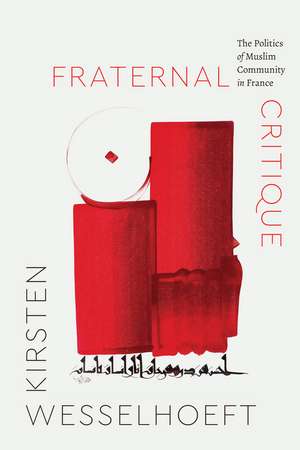Fraternal Critique: The Politics of Muslim Community in France: Class 200: New Studies in Religion
Autor Kirsten Wesselhoeften Limba Engleză Paperback – 22 mar 2025
The conversation about Islam in France is framed by the presumption that Muslim communities are a threat to secular solidarity or fraternité. In the face of state repression, French Muslims have not closed ranks around a narrow range of voices; instead, Kirsten Wesselhoeft finds that young Muslim activists have continued to purposefully spark debate about the values that anchor community life. Wesselhoeft argues that such disagreements, far from dividing communities, actually constitute a form belonging. Some activists call this ethic “fraternal critique,” and Wesselhoeft finds in it profound insights about the place for critique in civic life. The French state has reacted to Muslim solidarity with repression, but Wesselhoeft argues that unity need not come at the expense of dissent. Instead, fraternal critique can teach us how to build communities that are worth fighting over and fighting for.
Din seria Class 200: New Studies in Religion
-
 Preț: 207.21 lei
Preț: 207.21 lei -
 Preț: 98.61 lei
Preț: 98.61 lei -
 Preț: 121.30 lei
Preț: 121.30 lei -
 Preț: 168.19 lei
Preț: 168.19 lei -
 Preț: 169.14 lei
Preț: 169.14 lei -
 Preț: 185.07 lei
Preț: 185.07 lei -
 Preț: 217.61 lei
Preț: 217.61 lei -
 Preț: 241.26 lei
Preț: 241.26 lei -
 Preț: 262.76 lei
Preț: 262.76 lei -
 Preț: 222.42 lei
Preț: 222.42 lei -
 Preț: 208.18 lei
Preț: 208.18 lei - 23%
 Preț: 620.03 lei
Preț: 620.03 lei -
 Preț: 239.88 lei
Preț: 239.88 lei - 20%
 Preț: 237.12 lei
Preț: 237.12 lei - 21%
 Preț: 486.89 lei
Preț: 486.89 lei - 18%
 Preț: 152.10 lei
Preț: 152.10 lei - 22%
 Preț: 479.93 lei
Preț: 479.93 lei - 17%
 Preț: 165.63 lei
Preț: 165.63 lei - 21%
 Preț: 458.38 lei
Preț: 458.38 lei -
 Preț: 185.66 lei
Preț: 185.66 lei -
 Preț: 170.58 lei
Preț: 170.58 lei
Preț: 185.66 lei
Nou
Puncte Express: 278
Preț estimativ în valută:
35.54€ • 36.62$ • 30.00£
35.54€ • 36.62$ • 30.00£
Carte nepublicată încă
Doresc să fiu notificat când acest titlu va fi disponibil:
Se trimite...
Preluare comenzi: 021 569.72.76
Specificații
ISBN-13: 9780226838281
ISBN-10: 0226838285
Pagini: 224
Dimensiuni: 152 x 229 mm
Greutate: 0.45 kg
Ediția:First Edition
Editura: University of Chicago Press
Colecția University of Chicago Press
Seria Class 200: New Studies in Religion
ISBN-10: 0226838285
Pagini: 224
Dimensiuni: 152 x 229 mm
Greutate: 0.45 kg
Ediția:First Edition
Editura: University of Chicago Press
Colecția University of Chicago Press
Seria Class 200: New Studies in Religion
Notă biografică
Kirsten Wesselhoeft is associate professor of religion at Vassar College.
Cuprins
Introduction: Engaged Muslims in a Changing France
Part I: Forming a Contested Community
Chapter One: An Ethics of Discontent
Chapter Two: The People of Knowledge
Chapter Three: Sisterhood and Its Obligations
Part II: The Politics of Muslim Solidarity
Chapter Four: The Specter of Communalism
Chapter Five: From Secularism to Public Order
Conclusion: Social Ethics and the Fragilization of the Collective
Acknowledgments
Notes
Bibliography
Index
Part I: Forming a Contested Community
Chapter One: An Ethics of Discontent
Chapter Two: The People of Knowledge
Chapter Three: Sisterhood and Its Obligations
Part II: The Politics of Muslim Solidarity
Chapter Four: The Specter of Communalism
Chapter Five: From Secularism to Public Order
Conclusion: Social Ethics and the Fragilization of the Collective
Acknowledgments
Notes
Bibliography
Index
Recenzii
“In her wide-ranging and clearly conveyed ethnographic work, Wesselhoeft has succeeded in drawing a comprehensive picture of the efforts of a young generation of Muslims to build new institutions of learning in the greater Paris region. She deftly traces ways in which these young Muslims anchor their piety in lively debates about individual rights and women’s autonomy and in doing so gives the lie to misleading rhetoric labeling Muslims as ‘communalists.’”
“A gifted ethnographer, storyteller, historian, and ethicist, Wesselhoeft brilliantly explores in this book how Muslims in France organize and respond to state-supported hostility and racism. Her central concept, ‘fraternal critique,’ allows for an analysis of debates within social and political movements that does not reduce argument to infighting or division. Instead, Wesselhoeft suggests that it is in the arguing itself that solidarity is practiced and community constituted.”
